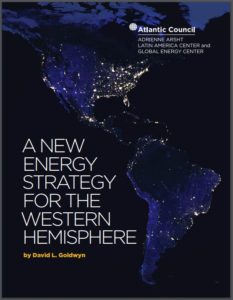Full Title: A New Energy Strategy for the Western Hemisphere
Author(s): David L. Goldwyn
Publisher(s): Atlantic Council
Publication Date: March 6, 2020
Full Text: Download Resource
Description (excerpt):
The Western Hemisphere has a unique advantage in global energy markets. It is rich in natural resources, from conventional fuels such as oil and natural gas, to critical minerals such as lithium for batteries. The region is also poised to become a leader in newer and emerging energy resources. It has, for example, abundant potential for solar and wind energy and other advanced energy technologies, such as nuclear energy. It enjoys high and rapidly growing levels of renewable energy, especially in power generation, largely based on significant levels of legacy, utility-scale hydropower. Many of the Americas’ subregions share cross-border electric power or liquid fuel interconnections. The vast majority of its nations share common values, including a commitment to democracy, the rule of law, and shared prosperity. The countries of the Americas are bound together through market-based trade, mutual investment, and deep cultural and security ties. Moreover, the hemisphere is indispensable to US energy security. The United States derives the majority of its imports of oil, gas, and electricity from its neighbors and there is considerable potential for trade in increasingly high-value minerals.
The region’s energy profile is heterogeneous, both in terms of resource endowment, national needs, and energy challenges. The region has been an incredible laboratory for experimentation in the clean energy transition. For example, Argentina, Chile, and Mexico have pioneered reverse auctions with great success. Five countries have employed some form of carbon pricing or emissions trading schemes to incentivize investment in new and lower-emission power generation. Argentina, Canada, and the United States have seen tremendous success in unconventional hydrocarbon exploration and production, while Brazil and Guyana have seen major successes in offshore exploration. This diversity of experience shows that the countries in the region have much to learn from each other.
